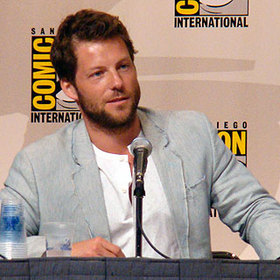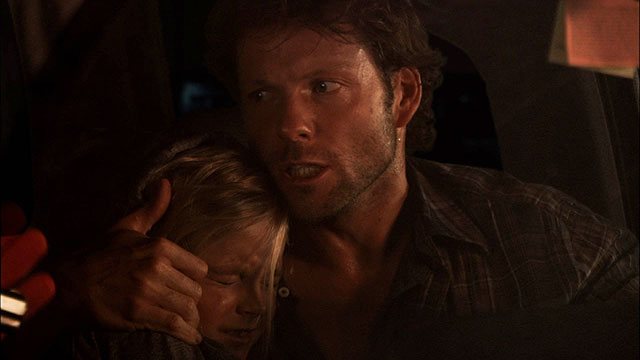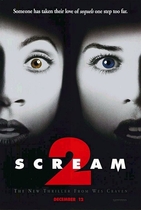Our editor-in-chief Nate Yapp is proud to have contributed to the new book Hidden Horror: A Celebration of 101 Underrated and Overlooked Fright Flicks, edited by Aaron Christensen. Another contributors include Anthony Timpone, B.J. Colangelo, Dave Alexander, Classic-Horror.com's own Robert C. Ring and John W. Bowen. Pick up a copy today from Amazon.com!
Jamie Bamber (Pulse 2) interview
As Lee Adama on the Sci-Fi Channel's Battlestar Galactica, Jamie Bamber faces the Cylons, a group of cybernetic beings who are the worst case scenario of man's continued development of increasingly complex technologies. Now, in Joel Soisson's Pulse 2: Afterlife (a sequel to the 2005 Kairo remake, Pulse), he is up against another result of technological expansion -- ghosts that are literally in the machines. We had a chance to talk to Bamber about his role in Pulse 2 while we were at San Diego Comic-Con this year.
Classic-Horror: Let’s start out with what Pulse 2 is about and what your role in it is.
Jamie Bamber: Well, the film is sort of the aftermath of an Internet-driven cataclysm and it’s sort of a metaphor for how we’ve lost our connection with other people and we’ve substituted computers for that connection. But this film isn’t about that, that’s sort of the given premise. This film is about one man’s response to this disaster. Say the end of the world happens – what is there that you could change? Are you willing to stand by that snapshot of your reality? It’s a father whose lost touch and become separated from his wife, has had an affair, and he’s lost touch with his kid. He’s trying to put all of the pieces of his little life back together in the face of this global disaster. So it’s kind of Kramer vs. Kramer meets [the] Armageddon.
C-H: And how did you get involved with the production?
Bamber: They asked me to do it and I was on a break from [Battlestar] Galactica and I had never fronted a movie before. I liked the original Japanese movie that it takes the premise from very much and I couldn’t really see a reason not to do it. And it was one of those where I should be relaxing, I should be taking a break, but… And I liked the character and I liked the familial elements of the story. It wasn’t… you know, I’m not really a genre freak, so for me it wasn’t a genre film. I was playing a dad trying to put his life right in one day.
C-H: So you came into the film for more of the dramatic aspect and you let the genre elements come in from the director or the script?
Bamber: They’re definitely not my responsibility and they’re not my priority. I’m always about the character and the story and the reality of the situation. We shot it on a green screen, but I didn’t have to work with creatures really. It was just me and Karley Scott Collins in a car largely in this movie, and a dad trying to protect his daughter in the face of disaster. That’s all I was concentrating on.
Stephen (Bamber) comforts Justine (Karley Scott Collins)
in this shot from Pulse 2: AfterlifeC-H: What did you draw on to portray this father who’s trying to put everything back together?
Bamber: Very easy. I’m a father trying to put everything together for my kids. The one thing about kids is… and love in general… is the more you love, the more you fear. And loss is the other side of love, and it’s always there as a potential. The more you care about something, the more you have the capacity to be hurt by something. As a father – as a young father – you know, I still understand that transition that’s happened to me… where my life is really not very important anymore and I have the responsibility. And the potential for catastrophe is huge, because anything that happens to my kids is… it happens to me. And there’s three of them and they’re young and they have their whole life in front of them. It’s scary on some level. So there was no acting really required.
C-H: What was the experience on the set in general? Was it generally a good experience?
Bamber: I was working with some people that I hope will be friends. Mike Leahy the producer and Joel Soisson the writer and director, tremendous human beings. I connected with them on day one. They created a really fun, creative, very workmanlike atmosphere. We had a lot of shooting to do every day. We shot a lot of it on green screen; it was a technical challenge. Everyone in Shreveport was great. The cast, y’know, they put a really nice cast together. I think of Carly, who plays my daughter and Georgina and Boti [Ann Bliss], too, who plays the lover of my character. Just a really nice bunch. I seem to be lucky that way. Everything I get involved in… I’ve never experienced a nasty set, so I’m very lucky. And this was not a nasty set.
C-H: Now this is something we ask of pretty much everyone. What are some of your favorite horror films?
Bamber: Anything directed by Michael Haneke – Funny Games, the original. Actually, Kairo. Horror, to me, is almost everything within… Okay, another one, let me think... The Shining. There, there you go.
Y’know, I don’t really think of genre. I think of just great storytelling where you’re just so invested and so terrified. The ways that Kubrick uses the camera in The Shining is just extraordinary and I think the same of the original Kairo… The spare, spare quality – time for the audience to wonder what’s going to happen, rather than being slapped around the head. Being told, “You’re about to be slapped around the head, you’re about to be slapped around the head. It’s not coming now, it’s not coming now. Here’s the… wow, there’s the shot!” That leaves me cold, because it’s so manipulative. I just love being showed a frame, and Michael Haneke does that in Caché with Juliet Binoche and Daniel Auteil and it’s one of my favorite films, too.
Classic-Horror would like to thank Jamie Bamber for taking the time to talk to us. Pulse 2: Afterlife comes out on DVD from Dimension Extreme on September 30th.
Jamie Bamber Comic-Con photograph by Amanda Stein.









